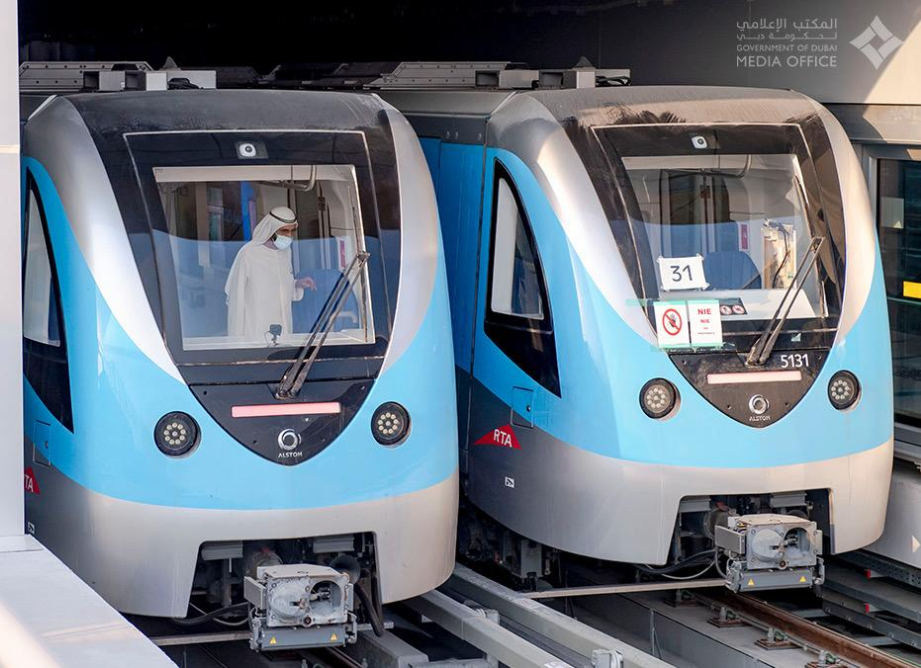Leading societies to a low carbon future, Alstom’s Managing Director for the Middle East, North Africa, and Turkey Mama Sougoufara reveals how the company is frontrunning energy-efficient mobility
French manufacturer and operator of rail transport across the globe Alstom has been part of region’s transportation and mobility development since the 1950s.
In the UAE, the sustainable mobility company delivered the Dubai tramway, the first fully integrated tramway system in the Middle East and the world’s first 100% catenary-free line, which opened in 2014. Since then, it has been awarded the maintenance of the tram for a period of 13 years.
Alstom delivered the turnkey automatic people mover (APM) system at Dubai Airports to connect Terminal 1 to Concourse D which opened for passenger services in February 2016 and designed to carry up to 200,000 passengers a day.

More recently, the Alstom-led consortium was responsible for delivering the world’s fastest-built turnkey driverless metro project, Dubai Route 2020 Metro extension, which was inaugurated in June 2020.
Elaborating on the Dubai Metro project, Sougoufara says: “We are proud of the work we did for Dubai Metro Route 2020’s 15km-long line.
“As a leader of the consortium, we were responsible for the integration of the entire metro system including 50 metropolis trainsets, power supply, communication, signalling, automatic ticket control, track works, platform screen doors and a three-year warranty on the whole system, as well as the enhancement of the existing metro line by upgrading power supply, signalling systems, communication, and track works.”
Middle East focus
Furthermore, in the region the company has several projects – completed and ongoing. In Saudi Arabia, Alstom, as part of FAST consortium, is supplying a fully integrated metro system for lines 4, 5 and 6, which includes 69 metropolis-based Riyadh Metro trains, as well as the delivery of 47 two-car driverless Innovia Metro 300 trains for line 3.
In Makkah, Alstom was part of the Haramain high-speed rail line between Mecca and Medina, supplying Talgo with the Mitrac TC 3300 propulsion equipment and Flexifloat high speed bogies for the powerheads of the 35 very high-speed trains as well as the VIP train for the 450km line.
Towards Jeddah, Alstom is also the supplier of the turnkey Innovia APM 300 automated people mover system at the King Abdulaziz International Airport and responsible for operation and maintenance until June 2022.
In Qatar, Alstom delivered the Lusail Tramway, the country’s first catenary-free tramway and a system that will provide efficiency, availability, and easier maintenance, supporting the country’s Vision 2030
Sougoufara says: “We are proud to be contributing to the sustainable mobility landscape in the region – as we are convinced that it will bring about the change needed towards a clean and ultimately emission-free energy system.”
A new shift
For decades the Gulf region was dependent on road transport – it’s only in the past 15 years that other modes of transport such as rail and marine have made inroads. “An efficient, tech driven rail network is rapidly becoming an important need. It can offer a much more efficient mode of transport for goods and people movement around the region,” Sougoufara suggests.
“The Middle East has experienced rapid economic development and has the youngest population in the world and second highest urbanisation rate in the world. This development can only be sustained by resilient and modern transport infrastructure,” he adds.
“For this purpose, it is important that the Middle East has modern, interconnected, and reliable public transport systems to ensure access to economic centres for everyone, reduce pollution and congestion.”
Sougoufara also believes that an efficient rail network will support the region’s drive to meet sustainability goals – particularly as the UAE and the Egypt gear up to host COP conferences.
He is of the opinion that at a regional level a robust and interconnected transport network will firmly position the Middle East as a business leader. “An example of this is the USD100bn GCC Rail project, which is set to open new trade corridors for business and travel opportunities.”
Sustainability at the centre
Alstom wants to capitalise on these opportunities and bring sustainable rail systems to the region. He explains: “The effects of climate change are increasingly felt across the world, putting sustainability at the forefront of everything. At Alstom, we are aware of this reality and the significant potential for better transportation solutions must curb worldwide emissions.
“Rail transportation is currently the most energy-efficient transport mode and therefore offering residents an efficient rail network will support the reduction per capita emissions. Approximately 85% of greenhouse gas emissions from the transport sector are related to the surface systems. Therefore, a single person switching from a car to public transport can save up to 20 pounds of their CO2 emissions per day. At Alstom, we have a full range of green traction options, so we can help our customers go even further to reduce their emissions and address the rapid urbanisation that is taking place across the region.”
Alstom is also introducing innovative digital solutions to increase capacity and improve efficiency throughout its operations. An example is the improved navigation software which not only reduces the carbon footprint but also addresses some of the biggest transportation issues such as traffic congestion.
Alstom has announced clear environmental targets for 2025 which include: achieving science-based CO2 emission reduction targets under the COP21 Paris Agreement; 25% reduction of CO2 emissions; 100% of newly developed solutions are eco-designed; and 100% of electricity supplied by renewable energies.
He says: “For us this means Alstom is looking to reduce its carbon emissions across the entire value chain. For our customers it means we are ready to work with them to address the challenges we collectively face because of rapid urbanisation and global warming.
“And we do it by addressing their individual needs, there isn’t a one size fits all solution and because we have the largest portfolio of solutions, we are able to provide them exactly what they need to meet their sustainability targets whatever they may be.”
And Alstom is not relying on a single green energy source. “There are many options to power mobility and transport systems. As a leader in sustainable mobility, Alstom has developed a wide range of green and innovative technologies to reduce emissions and pollution in catenary-free operation. Customers can choose from a wide portfolio of proven solutions based on Alstom’s unrivalled expertise in hydrogen, battery, or dual mode electric-hydrogen,” Sougoufara says.
He adds: “On the hydrogen front, we are proud to have the Coradia iLint, the world’s first hydrogen train in passenger service in Germany since 2018. This represents a true alternative to diesel power.
“Additionally, Alstom is a pioneer in battery trains and offers the trains for various platforms. We recently supplied the world’s first battery train for passenger operation in Germany.
“Depending on the need, infrastructure, and environment we will be able to advice customers on the best solution. We need to look at the entire eco-system and ensure when a green solution is introduced, the full system, including rolling stock, is optimised.”




